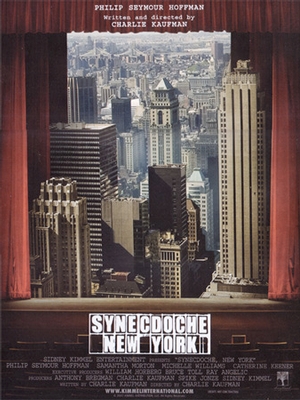 Synecdoche, New York is difficult, even for those expecting it to be so. It is a film that disappears into itself, but not in the way that it perhaps wants to. One character in the film analogises his lust into a dual chimaera, bound into itself in an infinite loop of connection. An apt metaphor for the film - an endlessly fascinating curiosity, but one that, by virtue of its interconnectedness, is essentially stuck, unable to establish a cultural dialogue with its immediate companions (which writer/director Charlie Kaufman claims to be Woody Allen; Annie Hall, we assume, orbited, perhaps, by Stardust Memories or something similar) as it shunts, confusingly, endearingly, but enragingly, back and forth. Despite this, I have a perverse desire to see it again.
Synecdoche, New York is difficult, even for those expecting it to be so. It is a film that disappears into itself, but not in the way that it perhaps wants to. One character in the film analogises his lust into a dual chimaera, bound into itself in an infinite loop of connection. An apt metaphor for the film - an endlessly fascinating curiosity, but one that, by virtue of its interconnectedness, is essentially stuck, unable to establish a cultural dialogue with its immediate companions (which writer/director Charlie Kaufman claims to be Woody Allen; Annie Hall, we assume, orbited, perhaps, by Stardust Memories or something similar) as it shunts, confusingly, endearingly, but enragingly, back and forth. Despite this, I have a perverse desire to see it again.
The plot concerns Caden Cotard, a death obsessed theatre director who recreates a block of downtown New York in a giant warehouse, in which a never ending theatre piece is enacted by a cast of hundreds, emulating the lives of real subjects. The film demands several leaps of faith from its viewer, the first and most prominent being the house that is constantly on fire (this is in the "real world", if it can be described as such). Despite its relatively minor role, the house is an oblique image that Kaufman refuses to explain, and one that proves a greater sticking point than the recreation of New York which, in a maddeningly disappointing move, is never given a full, visual exploration. It is, like the stage that it is, used as perpetual backdrop. Kaufman never gives real insight or pays prolonged attention to its improvising inhabitants, and never gives the viewer a geographically contiguous sense of how large it is, how it functions, what its limits are. It is this tantalising potential, never fully realised, that gives the film its strange allure.
The performances are uniformly good. Phillip Seymour Hoffman, in the lead role as Caden Cotard, is excellent, but "excellent" is a low standard for him. He has been better, and his role sometimes seems to be on a morbid autopilot. He is a cog in Kaufman's machine. A centrally important one, but a cog nonetheless, which makes his sparse moments of genuine emotional attractiveness or, at least, pathetic sympathy, all the more touching. They need not be so sparse, however. Kaufman's writing, it has been proven, could support more without the film collapsing under the weight of real emotion (God forbid).
Ultimately, it is the film's complex philosophical framework that is its greatest downfall. It is, paradoxically, too well rounded off at the end (though it is, perhaps, the most perfect ending in a film for a long, long time) to be truly satisfying. Adaptation is Kaufman's best film because it is beautifully flawed, its ending mixing ridiculous romance with the film's central conceit in a manner that doesn't quite work but is all the better for it. Adaptation is a film that spreads its tendrils wide into its cultural surroundings, and into the viewer's mind. Synecdoche, New York is an island unto itself, and its closed nature denies it true accessibility, and true greatness. Notably, Kaufman's previous and successful films have been directed by Spike Jonze or Michel Gondry, directors whose eclectic visual sensibilities and sense of the ridiculous (in lieu of any real feeling for substance) have transformed Kaufman's scripts from ponderous to enrapturing. Their absence is keenly felt: either might have trimmed Synecdoche, New York, making it - horror of horrors - more commercial. What we have instead is a wounded dinosaur of a movie. It is, in many ways, medieval in its values; an obsession with mortality, purification, art and artifice, and a simultaneous revulsion against and attraction to the female form. Not to mention its latent God complex. It's the film that you might get if you put William Langland or John Skelton into a time machine, and taught them how to use a camera. This is not necessarily a good thing.

